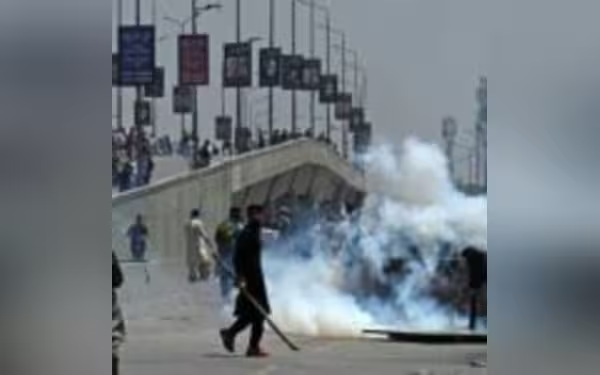Sunday, December 22, 2024 06:21 PM
ATC Finds Imran Khan Responsible for May 9 Riots in Lahore
- Imran Khan held accountable for May 9 riots.
- Court denies bail in multiple cases linked to unrest.
- Evidence includes testimonies and audio recordings.
 Image Credits: pakistantoday
Image Credits: pakistantodayATC in Lahore holds Imran Khan responsible for orchestrating the May 9 riots, denying bail in multiple cases linked to the unrest.
In a significant development in Pakistan's political landscape, the Anti-Terrorism Court (ATC) in Lahore has held Imran Khan, the founder of the Pakistan Tehreek-e-Insaf (PTI) party, responsible for orchestrating the riots that occurred on May 9. This ruling comes after a series of violent protests that shook the nation, leading to widespread damage and unrest.
The court's decision was based on the argument presented by Khan's legal counsel, which claimed that he was under arrest during the riots. However, the ATC deemed this argument unsatisfactory, stating that Khan had planned the unrest before his arrest. The six-page verdict issued by ATC Judge Manzar Ali Gill clearly outlined the court's reasoning for denying bail to Khan in eight separate cases linked to the May 9 riots.
According to the court, evidence was presented that included testimonies from police officers who had disguised themselves as PTI workers during meetings at Zaman Park. These meetings were reportedly held to plot the vandalism that occurred on May 9. Additionally, audio recordings were submitted as evidence, in which Khan could be heard inciting his supporters to engage in violent actions if he were to be arrested.
The court emphasized that the actions of PTI workers on that day were not merely spontaneous but were a direct result of Khan's instructions. The ruling stated that the party leadership, along with its workers, failed to control Khan's more extreme impulses, which led to chaos and violence, including attacks on military installations. The court noted that inciting violence is a serious matter and cannot be taken lightly.
Prosecutors revealed that the decision to attack military installations was made during meetings at Zaman Park on May 7 and 9. The court also referenced a bail plea filed by PTI Senator Ejaz Chaudhry in the Lahore High Court, where Khan's influential role was discussed. The court highlighted that Khan was not an ordinary individual; his followers acted on his commands without considering the potential consequences of their actions.
As a result of the court's findings, it was concluded that numerous incidents of violence, including assaults on police officers and attacks on government buildings, occurred on May 9. Consequently, the court rejected Khan's bail application, reinforcing the notion that accountability must be upheld in the face of such serious allegations.
This ruling not only impacts Imran Khan's political future but also raises questions about the broader implications for political discourse and protest in Pakistan. As the nation grapples with the aftermath of these events, it is crucial for all political leaders to reflect on the importance of peaceful dialogue and the responsibility that comes with leadership. The events of May 9 serve as a stark reminder of the potential consequences of incitement and the need for a commitment to non-violence in political expression.













